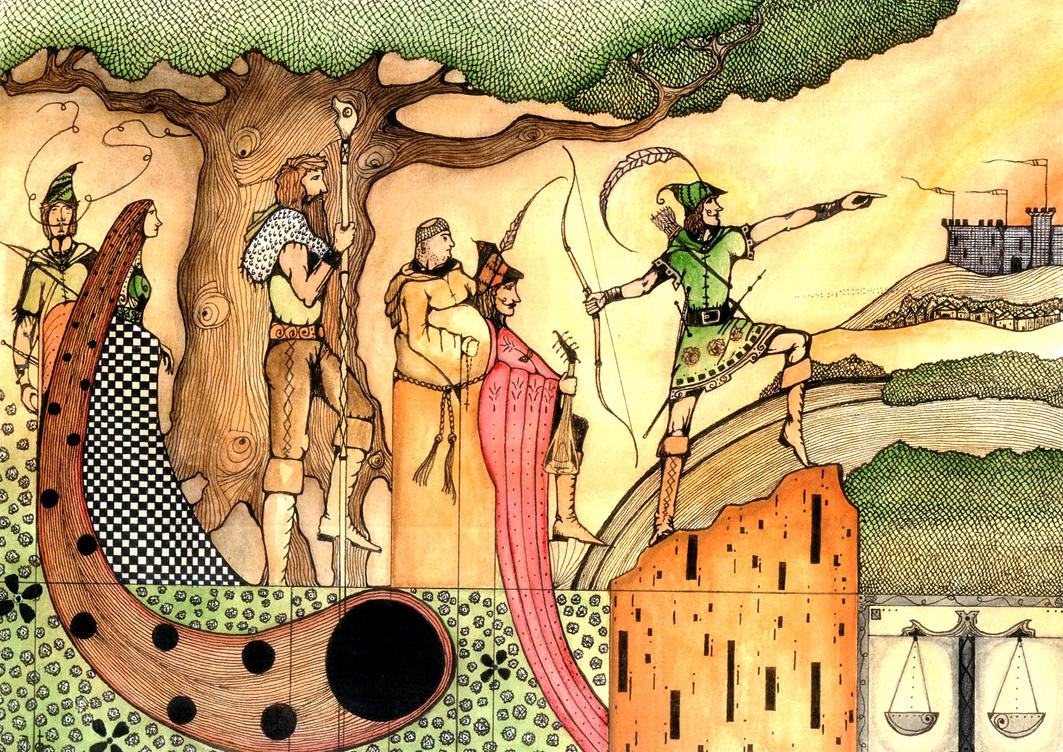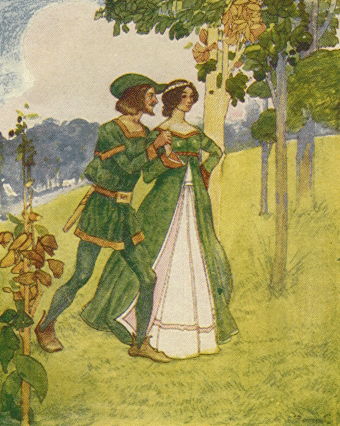 |
| mlpeters |
Personally, I love it when Robin Hood pops up in a story. Among legendary figures, I think he stands out tremendously. Not only is he a more ordinary and down to earth figure than say, Beowulf or King Arthur, but he's a downright fun one. As much as I love them, a surprise appearance from any other legendary hero in a novel just doesn't give me that happy jolt in the stomach that Robin Hood seems to do. I think it's far from a coincidence that two of my all time favorite novels, Ivanhoe and The Once and Future King, both feature a Robin Hood character.
And so I don't find it surprising at all that my favorite poet, John Keats once wrote a poem about Robin Hood. (If you haven't read any John Keats yet please, please do so now.) As a Romantic poet, Keats is often studied with poets like Wordsworth and Shelley, but his love for Faerie and folklore (which shines in poems like La Belle Dam Sans Merci and re-tellings of Medieval tales like Isabella) sets him far apart. His poem on Robin Hood was written in 1818, in response to his good friend and fellow poet, John Hamilton Reynolds, who wrote and sent him these three sonnets celebrating Robin Hood:
I.
Of
freedom in the name? – It tells the story
Of
Clenched oaks, with branches bow’d and hoary,
Leanng
in aged beauty o’er the grass;--
Of
dazed smile of cheek of border lass
Listening
‘gainst someold gate at his strange glory;
And
of the dappled stag, stuck down and gory,
Lying
with nostril wide in green morass.
It
tells a tale of forest days—of times
That
would have been most precious unto thee:
Days
of undying pastoral liberty:--
Sweeter
than music old of abbey chimes—
Sweet
as the virtue of Shakepearian rhymes—
Days,
Shadowy with the magic green-wood tree!
II.
The
trees in Sherwood forest are old and good,
The
grass beneath them now is dimly green;
Are
they deserted all? Is no young mien
With
loose-slung bugle met within the wood:
No
arrow found--foil'd of its antler'd food,
Struck
in the oak's rude side? is there nought seen,
To
mark the revelries which there have been
In
the sweet days of merry Robin Hood?
Go
there, with summer, and with evening--go,
In
the soft shadows like some wandering man,
And
thou shalt far amid the forest know
The
archer men in green, with belt and bow,
Feasting
on phesant, river-fowl, and swan,
With Robin at their
head and Marian.
III.
And
horn of ivory mouth, and buckle bright,
And
arrows winged with peacock feathers light,
And
trusty bow well gathered of the yew,--
Stands
Robin Hood: and near, with eyes of blue
Shining
thro' dusk hair, like the stars of night,
And
habited in pretty forest plight,--
His
green-wood beauty sits, young as the dew.
Oh
gentle tressed girl! Maid Marian!
Are
thine eyes bent upon the gallant game
That
stray in the merry Sherwood? thy sweet fame
Can
never die. And thou, high man,
Would
we might pledge thee with thy silver can
Of
Rhenish in the woods of Nottingham.
These three sonnets could definitely be read as one continuing poem. The first sonnet describes Robin Hood as a story, a tale of old set in an earlier, idyllic time and place, a time of "undying pastoral liberty." The second sonnet picks up right where the first one leaves off, but the "magic green wood tree" of the Robin Hood tale becomes our own "trees in Sherwood forest...old and good." The whole of Sonnet 2, in fact, suggests that the magic of the Robin Hood story has never actually left us. Even though there is "no arrow found" or nothing to physically "mark the revelries...of Merry Robin Hood," we can come to understand and "know" the legend simply by walking through the forest and imagining the tale. Finally, what begins as a sort of vision in the second sonnet becomes a reality in the third. Robin and Marian get detailed descriptions, as if they really are right in front of us. More than that, they grow from figures from an old tale to immortal legends, as Marian's "sweet fame/ can never die."
Keats' poem is slightly more complex. He opens with the melancholic reply of "No! Those days are gone away/ And their hours are old and grey." The forest, the poem begins to suggest, is not a place where you will come across Robin Hood- even in your imagination. In fact, far from showing Robin Hood, the woods bury him under the "leaves of many years." Reynolds celebrated the immortality of the Robin Hood legend, but Keats repeatedly laments that it is all "gone" and that the forest is silent and empty when "the bugle sounds no more" and the "twanging bow [is] no more." Throughout the poem, Keats is concerned with Time and what it does to people, to history, and to legends. As he begins to state that "you never may behold Little John, or Robin bold," he, like Reynolds, paints an illustrious scene of Robin and his band. Unlike Reynolds however, Keats seems to do so in order to show what the modern world is missing, rather than what it currently holds: Gone, Gone, Gone, "All are gone away and past." Keats muses that even if Robin and Marian were here in the modern world, they would be sorely disappointed and disoriented: "She would weep and he would craze." Thus the poem is not only a lament for Robin Hood's passing, but for the condition of the modern world.
Wonderfully, beautifully, Keats ends his poem in the way that only he can:
"So it is" he states, "Yet let us sing!"
Robin Hood
BY JOHN KEATS
TO A FRIEND
No! those days are gone away
And their hours are old and gray,
And their minutes buried all
Under the down-trodden pall
Of the leaves of many years:
Many times have winter's shears,
Frozen North, and chilling East,
Sounded tempests to the feast
Of the forest's whispering fleeces,
Since men knew nor rent nor leases.
No, the bugle sounds no more,
And the twanging bow no more;
Silent is the ivory shrill
Past the heath and up the hill;
There is no mid-forest laugh,
Where lone Echo gives the half
To some wight, amaz'd to hear
Jesting, deep in forest drear.
On the fairest time of June
You may go, with sun or moon,
Or the seven stars to light you,
Or the polar ray to right you;
But you never may behold
Little John, or Robin bold;
Never one, of all the clan,
Thrumming on an empty can
Some old hunting ditty, while
He doth his green way beguile
To fair hostess Merriment,
Down beside the pasture Trent;
For he left the merry tale
Messenger for spicy ale.
Gone, the merry morris din;
Gone, the song of Gamelyn;
Gone, the tough-belted outlaw
Idling in the "grenè shawe";
All are gone away and past!
And if Robin should be cast
Sudden from his turfed grave,
And if Marian should have
Once again her forest days,
She would weep, and he would craze:
He would swear, for all his oaks,
Fall'n beneath the dockyard strokes,
Have rotted on the briny seas;
She would weep that her wild bees
Sang not to her—strange! that honey
Can't be got without hard money!
So it is: yet let us sing,
Honour to the old bow-string!
Honour to the bugle-horn!
Honour to the woods unshorn!
Honour to the Lincoln green!
Honour to the archer keen!
Honour to tight little John,
And the horse he rode upon!
Honour to bold Robin Hood,
Sleeping in the underwood!
Honour to maid Marian,
And to all the Sherwood-clan!
Though their days have hurried by
Let us two a burden try.
 |
| Artofwarble |




Thanks for writing about these poems! I've read many a Robin Hood retelling, but I hadn't come across these poems until I came across this posting through Pages Unbound's read along. I especially enjoy the one written by Keats! :)
ReplyDeleteI'm glad you enjoyed them! Anything by Keats is my favorite as well :) I'm heading over to read your own post right now...
ReplyDelete:)
these poems is so beautiful,you are Genius.
ReplyDeletei will keep these poems in my mind.
thanks for your share